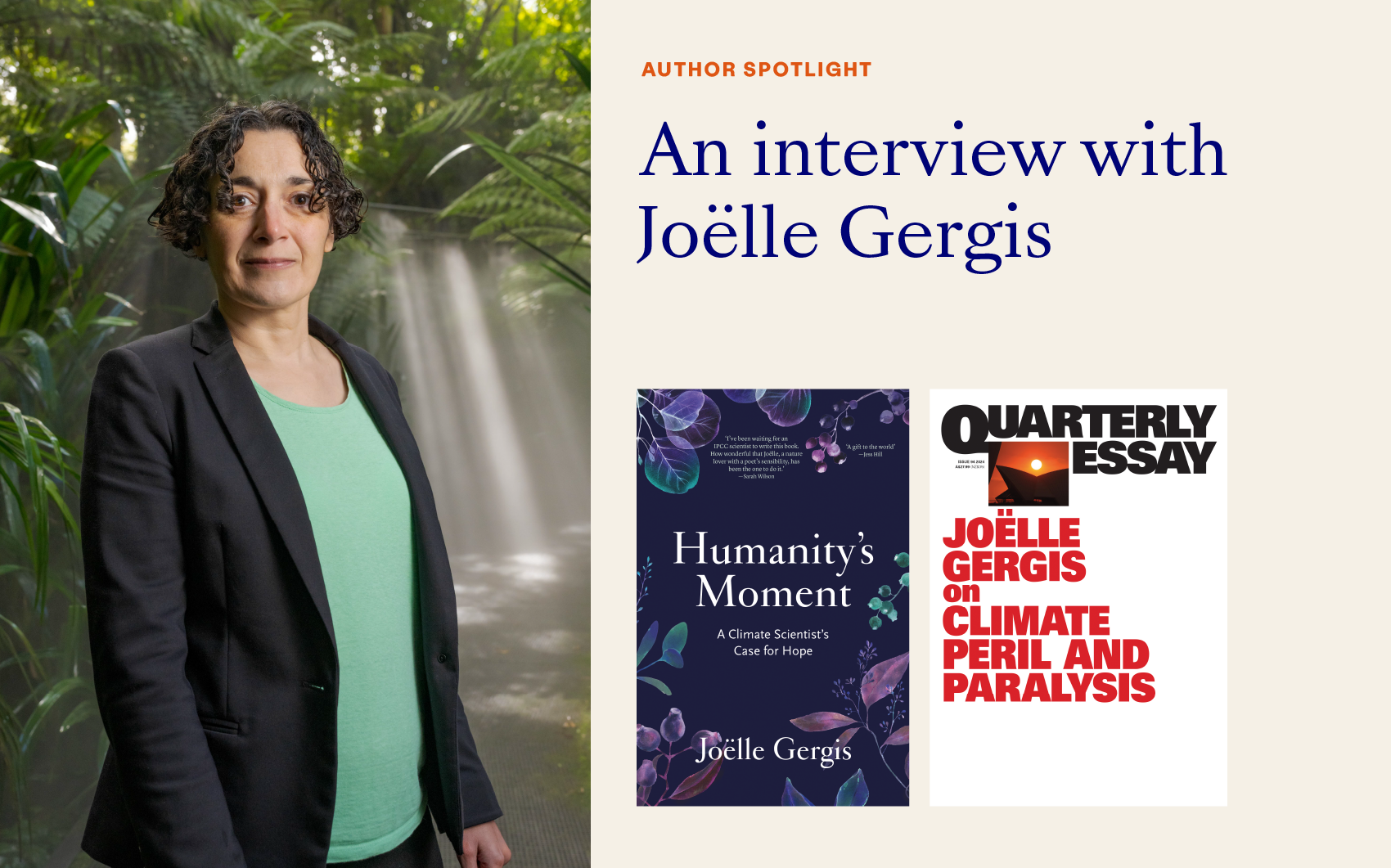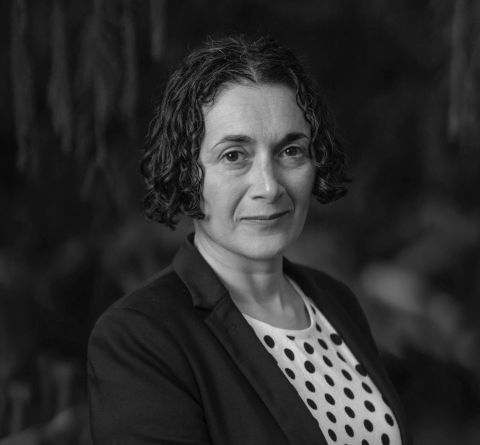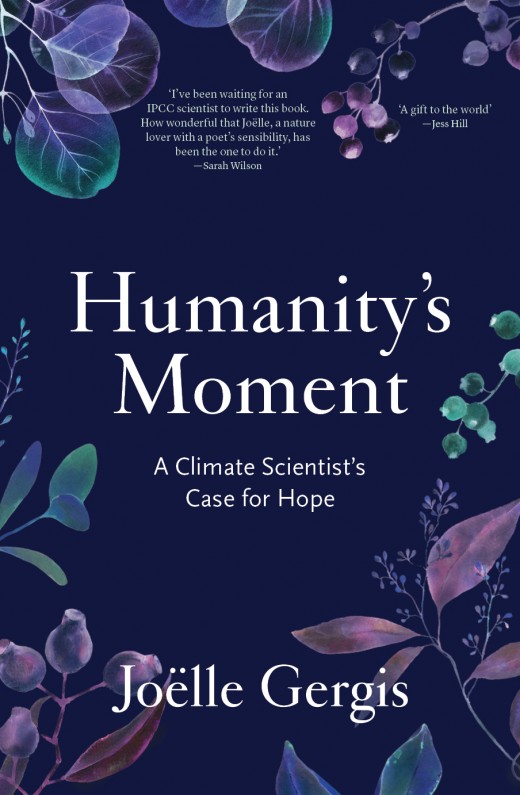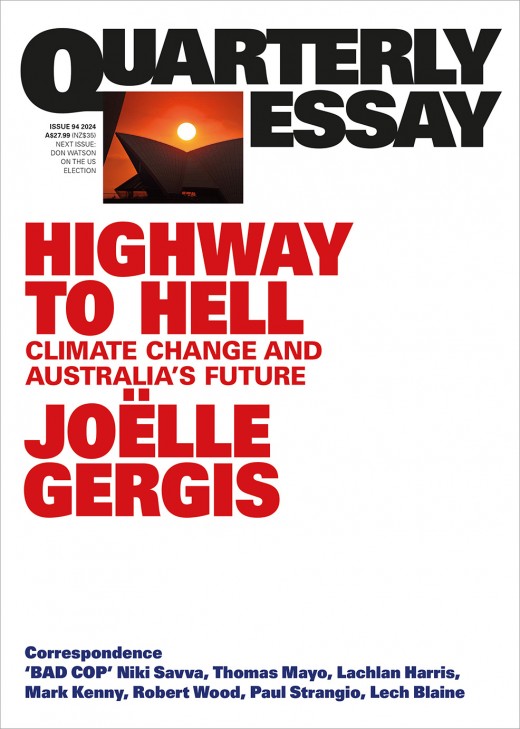News

News >
Author Spotlight on Joëlle Gergis
Welcome back to the Author Spotlight series. Today, we’re shining the spotlight on award-winning writer and climate scientist Joëlle Gergis. In this inspiring interview, Joëlle talks about the spark behind her book Humanity’s Moment and the path to getting it published, what fuels her hope for the planet’s future, and what to expect from her forthcoming Quarterly Essay.
Dr Joëlle Gergis is a lead author on the United Nations’ Intergovernmental Panel on Climate Change Sixth Assessment Report – a global, state-of-the art review of climate change science. Her 2022 book Humanity’s Moment was shortlisted in the Australian Book Industry Awards and Queensland Literary Awards, and won Scholarly Book of the Year in the 2023 Educational Publishing Awards Australia. She’s now working on a Quarterly Essay on climate peril and paralysis, which will be out in June.
How did your book Humanity’s Moment come to be (and come to be acquired by Black Inc.)?
Humanity’s Moment came about from wanting to share my experience of being an Australian climate scientist involved in the latest United Nations climate report developed by the Intergovernmental Panel on Climate Change (IPCC).
Being an IPCC lead author was a life-changing experience, as I got a chance to assess the scientific evidence for climate change from every corner of the world. The scale of the climate crisis hit me in a visceral way. I knew I had to find a way to share the concerns of the scientific community with as wide an audience as possible, but I also realised I needed to find a more human way of talking about things. This led to the Humanity’s Moment being written as a blend of memoir and science, which isn’t an approach that is commonly taken with this topic. It was my way of trying to rehumanise the conversation about climate change, which can sometimes feel very overwhelming or technical.
My agent Jane Novak did a great job shopping the proposal around: we ended up with offers from five terrific publishers so the decision was difficult! I went with Black Inc. in the end as my editor really connected with my idea, and I wanted to be part of a team that publishes the best non-fiction in the country.
While in many ways, Humanity’s Moment is a heartbreaking read – about the rapid advancement of climate change, in the context of your work on the IPCC Sixth Assessment Report – it’s also imbued with hope and courage. What is it that sustains your hope for the future of our planet?
What gives me hope is that the social movement needed to protect our planet is growing by the day. People have enormous capacity for change, we just need to be motivated by something we truly care about.
Just this morning I received an email from a climate change sceptic whose son gave them a copy of Humanity’s Moment for Christmas. They laughed, but promised to read it to make him happy. They were surprised to find themselves in tears just reading the prologue. They wrote to tell me that my book changed their life. I’m very moved when readers reach out to share stories like this with me.
Ultimately what keeps me going is knowing that in all darkness, there is light. We can choose to be a source of goodness in a bruising world. We can be a person that helps restore another person’s faith in humanity. Sometimes I lose sight of hope for the future, but sheltering in the goodness of others helps me weather the storms.

Joëlle’s writing studio.
You’re now writing a Quarterly Essay on climate peril and paralysis, out in June. Will this essay reflect any change in your perspective since Humanity’s Moment was published in 2022? Do you still see us rising to the challenge of global warming?
My Quarterly Essay is an update on the state of the climate and the political response to addressing climate change since Humanity’s Moment was published in 2022. A lot has happened in Australia and globally since then, but progress is still inadequate and the impacts of climate change are escalating. My essay is a wake up call that I hope helps trigger a more appropriate response to the crisis we are facing.
On a lighter note – when it comes to your writing practice, are you a meticulous planner, or do you wait for a structure to form organically?
While I’m more of a planner than a free-form writer, I don’t like to over-engineer things. I tend to sketch out a general outline first and then flesh my ideas out with dot points to help get started. I’m always open to seeing what arises in the writing process, but I use my outline as a roadmap of where I’m trying to go. Sometimes the path meanders, but having a basic idea of the structure helps keep me on track.
Is there a particular part of the publishing process that you love or hate the most?
I find the copy-editing stage the most stressful stage of the publication process. With scientific writing, sometimes changing a single word can alter the technical meaning, so it’s important I work with an editor who has a light touch.
The thing I love most is the actual writing process itself. I really enjoy crystallising my ideas on the page in ways that help other people make connections they haven’t made before.
Of course, holding the finished product in your hands for the first time is really special. Publishing is such a team effort – it's an emotional experience seeing a book come to life.
What’s one book you think everyone should read?
Humanity’s Moment. If you only ever read one book about climate change, please consider reading mine. It might speak to you in unexpected ways. The social movement needs you!
To read a chapter of Humanity’s Moment, click here. To learn more about Joëlle’s forthcoming Quarterly Essay on climate peril and paralysis, click here.
To read our previous Author Spotlight, an interview with Benjamin Law, click here.
Share this post
About the author
Dr Joëlle Gergis is an award-winning climate scientist and writer. She served as a lead author for the IPCC Sixth Assessment Report and is the author of Sunburnt Country: The History and Future of Climate Change in Australia. Joëlle has also contributed chapters to The Climate Book by Greta Thunberg, and Not Too Late: Changing the Climate Story from Despair to Possibility, edited by Rebecca Solnit and Thelma Young Lutunatabua.
More about Joëlle Gergis





